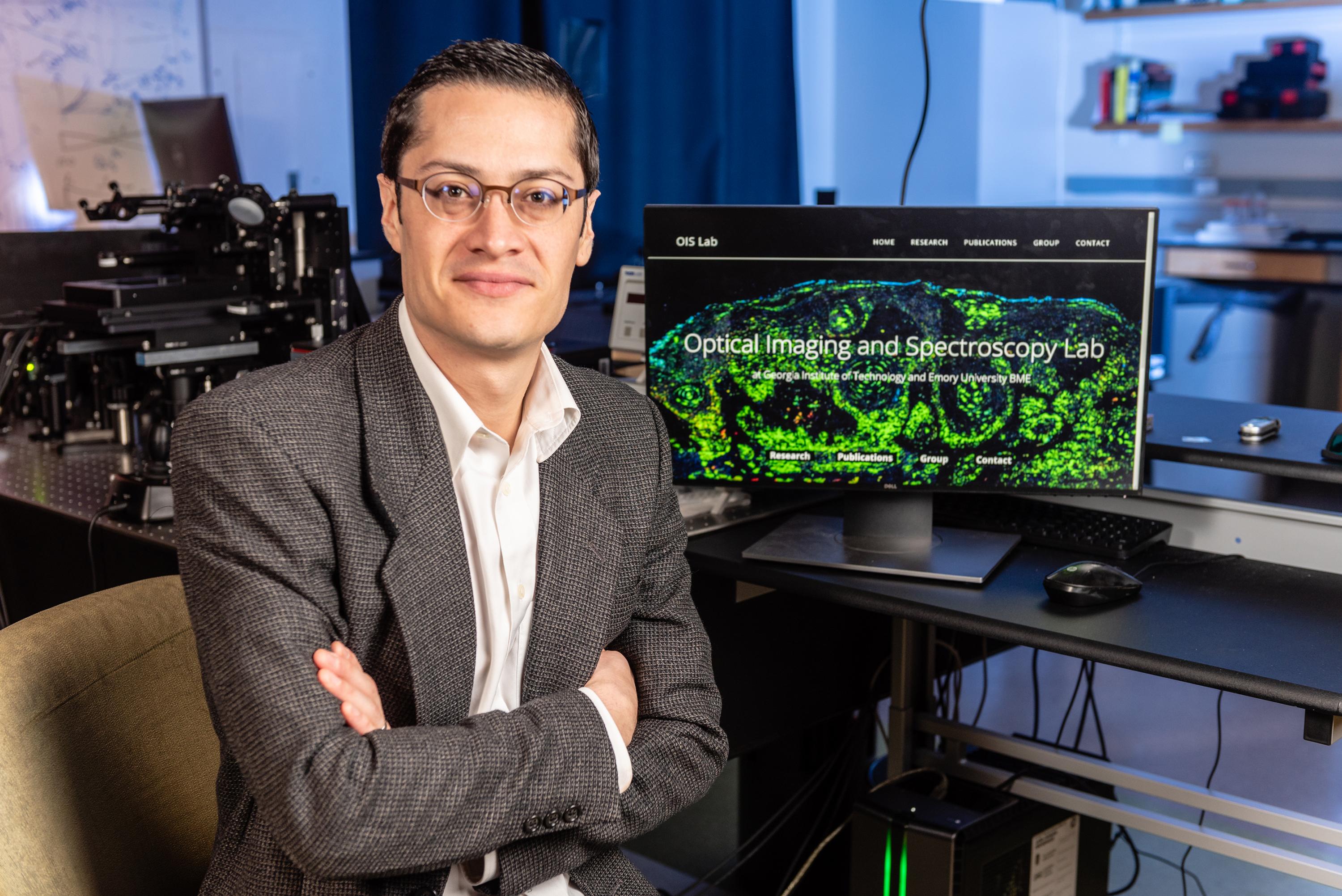
Blood tests are a must before a patient can receive critical treatment, for example, before undergoing a round of chemotherapy. Currently, complete blood count (CBC) procedures—the most common form of hematological analysis—are only performed at certified labs that have adequate equipment, resources, and personnel. Patients in rural areas, for example, must travel hours to access this vital information. The limited availability of such tests and the time involved in the testing process can delay treatment, which can be a problem when time is of the essence. A new startup company, Cellia Science, Inc., aims to change this.
Founded in 2021, Cellia was spun out of research from Georgia Tech’s Wallace H. Coulter Department of Biomedical Engineering and Emory University. With funding from VIC Technology Venture Development, Cellia is making point-of-care hematology analyzers based on a novel ultraviolet (UV) microscopy system that is exclusively licensed from Georgia Tech. The goal is to envision the future of patient care by developing a device that can be used at home to provide rapid results.
The technology: Streamlined, compact hematological analysis
The highly effective, simplified method for hematology analysis was developed in the Georgia Tech lab of Dr. Francisco Robles, Cellia’s chief science officer. Deep UV microscopy enables cell analysis without the chemical reagents or any other exogenous labels that often interfere with image or sample quality and make procedures complex. Currently, the CBC, which uses a number of chemical reagents, is the standard of care, but the technology is expensive and requires time-consuming procedures. Technologies that use fluorescent agents are faster, but they still require an additional labeling step that calls for added resources, expenses, and expertise. A label-free approach, such as the one Georgia Tech developed, avoids such complications.
This innovative method allows for the quick collection of molecular information from live cells without causing cell damage or alteration. The short wavelength and molecular specificity of UV light provides a high-resolution molecular image that allows for highly specific cell phenotyping. Because the method is based on endogenous, label-free molecular imaging, it provides consistent and accurate diagnoses. This cost-effective method delivers timely results and enables critical testing to be performed at the point of care and potentially in at-home and/or low-resource settings.
The licensee: Developing portable blood cell analyzers for rapid results
Using the label-free, deep-UV imaging technology exclusively licensed from Georgia Tech, Cellia was founded to develop and commercialize blood cell analyzers that provide quick, actionable blood cell counts at the point of care. The technology uses algorithm-based cell identification and classification, and microfluidics enable point-of-care testing. The goal is to bring rapid, accurate blood cell assays out of the lab and into the clinic and even the home.
“It’s a whole new way to analyze blood cells. Because the technology enables high-quality blood cell images, you’re able to get high-accuracy information quickly with minimal sample processing,” said Dr. Kelly Mabry, VIC’s executive-in-residence, a former VIC fellow, and now Cellia’s chief executive officer. “The technology opens up a lot of applications that aren’t addressed well by conventional instruments in this space.”
The impact of technology transfer: At-home device for the future of cancer care
As a result of the technology transfer, Cellia is creating a test that is small, affordable, and easy to use. The company’s first device will provide five-part white blood cell differentials, hemoglobin quantification, and platelet counts for chemotherapy patients at risk of neutropenia (when a patient has too few neutrophils, an infection-fighting white blood cell), anemia, or thrombocytopenia (when a patient has a low blood platelet count, which is concerning because platelets are used to stop bleeding). Currently, such results may take hours or days to receive. Cellia’s technology will bring the testing to the patients, providing results in minutes.
“We’re really trying to develop a device that addresses not only the existing clinical needs, but that will also enable more decentralized care, which we see as the future for cancer care,” said Dr. Mabry. “A simple, portable device that could be taken by a practitioner into a patient’s home and inform their medical care decisions could be a big value-add for new care modalities.”
The technology transfer serves as a successful model for Georgia Tech’s initiative to rapidly move promising technologies out of the lab and into the market.
“This technology has the potential to change diagnostics,” said Kashmira Kulkarni from Georgia Tech’s Office of Technology Licensing. “There are several aspects of this technology that have the potential to make an impact, and that combined with VIC being a strong partner and having a vision is what helped us move through commercialization.”
The future: Expanding applications to further benefit patients
With a current focus on product development, Cellia’s goal is to have clearance from the U.S. Food and Drug Administration and product launch by 2025. Beyond the technology’s near-term goal of being transformative for patients’ existing therapies, it has the potential to help with future therapies as well. The technology’s ability to collect more data could enable more personalized care that can ultimately aid in the understanding of disease and mechanisms and drug treatments. The Cellia team plans to continue to expand the technology’s applications to further benefit patients.
“Because we’re doing molecular imaging, we can learn more about the cells,” said Dr. Robles. “There is a direct line to benefitting the patient in a really short time from what is done in the lab to what can be delivered at the bedside or home: It’s just an update to the ways we analyze the data to provide more useful information to the patient—and that’s really exciting.”
Cellia Science, Inc. is making point-of-care hematology analyzers based on a novel ultraviolet (UV) microscopy system that is exclusively licensed from Georgia Tech. The goal is to envision the future of patient care by developing a device that can be used at home to provide rapid results.
